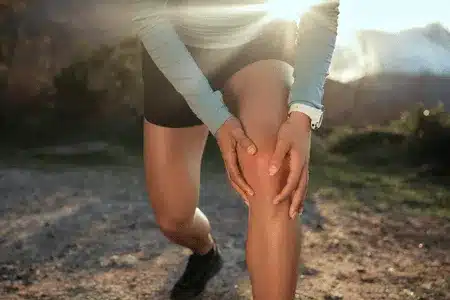
Are you wincing with each step as you walk? Does your knee hurt when you climb the stairs at home? You're not alone. Knee pain affects countless residents in our community, from student athletes to active seniors enjoying our local walking trails. Many feel pain due to common overuse injuries, while others struggle with more severe pain that needs medical attention.
Living with knee pain can transform simple daily activities into challenging ordeals. The knee joint is the largest and most complex joint in the human body, connecting muscles and bones that enable us to walk, run, and enjoy the active lifestyle that makes Sunnyvale special. Understanding the causes of knee pain is the first step to finding relief and discovering the best ways to treat knee pain effectively.
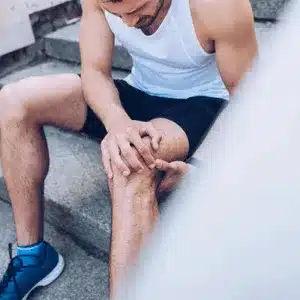
Knee pain often strikes unexpectedly—maybe your knee hurts while gardening or lingers after a walk. What starts as minor knee pain from tight muscles or a previous injury can progress into serious knee problems like knee osteoarthritis, rheumatoid arthritis, or a torn meniscus.
The joint is a complex structure of knee bones, cartilage, and tissue. Damage or inflammation in any part can cause knee pain, limit movement, and make it hard to bear weight.
Many adults and older residents experience knee pain that worsens over time due to stress and untreated joint pain. Early action like physical therapy, knee braces, and applying ice packs can bring relief, reduce inflammation, and prevent pain.
Swelling around the knee joint often indicates inflammation. If your knee appears puffy or feels tight after your morning walk, your body is sending a clear warning signal that something may cause knee pain.
Redness and warmth around one knee or two area suggest potential infection or severe inflammation. These symptoms require immediate medical evaluation from knee specialists to rule out serious knee pain causes.
Instability or the feeling that your knee might "give out" while walking is particularly concerning. This sensation often indicates damage—sometimes involving the anterior cruciate ligament—that could worsen dramatically.
Popping or crunching noises when you bend or straighten your knee aren't just annoying—they're informative. These sounds, medically known as crepitus, often signal damage to the cartilage that serves as shock absorbers for your joints and can make your sore knee feel pain.
Limited mobility that prevents you from fully straightening or bending your knee can severely impact your daily routine. When you struggle to get in and out of your car, it's time to seek professional help and explore other treatments that can provide long-term relief.
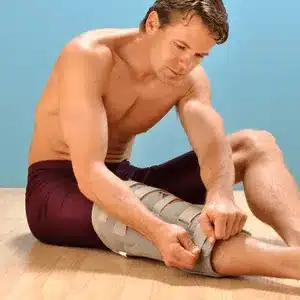
Untreated knee pain often worsens over time. What may begin as minor knee pain from tight muscles or a previous knee injury can lead to knee arthritis, patellofemoral pain syndrome, or a torn meniscus. As the knee joint weakens, stress, mechanical problems, or tissue damage like a torn cartilage may cause severe pain and limit everyday activities—especially when aggravated by other bones or common injuries that affect knee stability.
Many adults and seniors experience knee pain that affects their independence. Reduced movement weakens muscles, worsens pain, and impacts blood flow to the cartilage. Physical therapy, knee braces, or ice packs may help relieve pain, reduce inflammation, and prevent knee pain, especially when combined with other treatments for underlying medical conditions. Don't wait—see a doctor to explore treatment options that treat knee pain and avoid knee surgery.
Athletic endeavors frequently lead to anterior cruciate ligament injuries—one of the most serious knee injuries. ACL tears can occur during sudden stops or direction changes in sports like soccer and basketball, activities popular among Sunnyvale's youth.
A torn meniscus is particularly common among our active adult population. This injury to the c-shaped cartilage that cushions your knee occurs during twisting motions, even during seemingly harmless activities like gardening or getting out of your car.
Fractures of the knee bones can happen to anyone, but they're especially concerning for our senior residents. A fall on walking trails can lead to serious knee fractures.
Patellar tendinitis, often called "jumper's knee," affects many of our community's basketball enthusiasts and runners. The repetitive stress placed on the patellar tendon that connects the kneecap to the shinbone causes inflammation and pain.
Knee bursitis occurs when the small fluid-filled sacs (bursae) that cushion the joint become inflamed. This painful condition often results from prolonged kneeling while gardening—a favorite pastime for many Sunnyvale homeowners.
A dislocated kneecap occurs when the triangular bone covering the front of your knee (patella) slips out of place. This painful condition is particularly common among Sunnyvale's teenage athletes, especially young female participants in sports.
Iliotibial band syndrome frequently troubles runners using the trails around Lake Ray Hubbard. This condition occurs when the ligament running from the outside of your hip to your knee becomes tight and rubs against the outer portion of your thighbone.
A loose body—a piece of bone or cartilage that breaks off and floats in the knee joint—can cause periodic locking sensations. These fragments often result from wear and tear or injuries that are common among our active community members.
Foot pain or problems with your hips can alter your gait, placing unusual stress on your knees. Many residents discover that their knee pain actually stems from issues elsewhere in their lower leg or body.
Hip or foot alignment issues that affect many residents often lead to patellofemoral pain syndrome. This condition causes pain between the kneecap and the thighbone, particularly when climbing the stairs at Town Center shops.
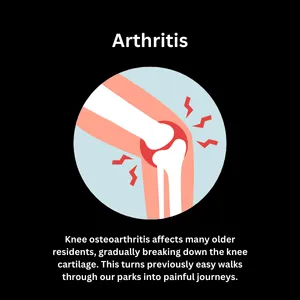
Knee osteoarthritis affects many of Sunnyvale's older residents, gradually breaking down the knee cartilage that normally allows for smooth movement. This most common type of arthritis turns previously easy walks through our parks into painful journeys.
Rheumatoid arthritis can strike at any age, even affecting younger adults in our community. This inflammatory condition causes the synovial membrane surrounding your knee joint to become inflamed and swollen, leading to cartilage and bone damage.
Gout, a type of arthritis caused by uric acid crystal formation, can affect the joint with sudden, severe attacks of pain, tenderness, and redness.
Pseudogout resembles gout but results from calcium pyrophosphate crystal deposits rather than uric acid. This form of arthritis particularly affects older adults in our community.
Septic arthritis represents a medical emergency requiring immediate attention. This joint infection, which can destroy cartilage rapidly, requires prompt treatment from specialists at local facilities like Miller's Orthopaedic Sports Medicine.
Excess weight places enormous pressure on your knee joints, particularly when navigating Sunnyvale's hilly areas. Each extra pound adds four pounds of pressure on your knees when walking, significantly increasing your risk of developing knee pain.
Previous knee injury dramatically raises your chances of experiencing future knee problems. Many local residents who sustained sports injuries in their youth find these old injuries returning to haunt them decades later.
Certain sports place participants at increased risk for knee injuries. Basketball at local courts, running on uneven trails, and tennis on hard surfaces all create stress that can lead to both acute and chronic knee pain.
Jobs requiring repetitive knee stress affect many in our community. Construction workers, gardeners, and floor installers often develop knee pain from activities that involve frequent kneeling, squatting, or heavy lifting.
Tight muscles and lack of flexibility contribute significantly to knee issues among Sunnyvale residents. Regular stretching exercises can prevent many cases of knee pain before they begin.
The RICE protocol—Rest, Ice, Compression, and Elevation—provides immediate knee pain relief for many acute conditions. Simply rest your leg, apply ice packs for 20 minutes several times daily, using compression bandages, and elevating your leg can significantly reduce pain and swelling.
Over-the-counter pain relievers like ibuprofen or naproxen sodium can help reduce inflammation and temporarily relieve pain. These medications provide short-term relief while you arrange for proper medical evaluation at local facilities.
Gentle stretching and strengthening exercises, when appropriate, can promote healing and prevent further injury. Many residents find that maintaining strong joints around the joint provides substantial protection against future problems.
Physical therapy offers customized exercise programs to strengthen the muscles around your knee joint, increase flexibility, and reduce pain. These professionals help restore function and prevent recurrence.
Injections performed by our local knee specialists can provide significant relief. Corticosteroid injections reduce inflammation, while hyaluronic acid injections add cushioning fluid to the joint, helping it function more smoothly.
Arthritis pain often responds well to treatments. From medication management to specialized physical medicine approaches, local providers offer comprehensive care for all forms of knee arthritis.
Knee braces and arch supports properly fitted by local specialists can redistribute weight away from damaged portions of your knee. These devices provide stability and often allow residents to maintain active lifestyles despite knee issues.
When conservative approaches aren't sufficient, surgical interventions from our expert local surgeons can repair or replace damaged joints. From arthroscopic procedures to total knee replacements, these treatments can restore function and eliminate pain.
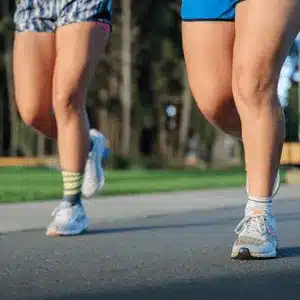
Maintaining a healthy weight represents one of the most effective ways to prevent knee pain. Many Sunnyvale residents find success with our community's walking groups and nutrition programs designed to help lose weight and reduce joint stress.
Building strong muscles around the joint through regular exercise protects this crucial connective tissue from damage. Our local fitness centers offer specialized programs focusing on proper knee support and function.
Proper footwear with adequate support prevents altered gaits that cause knee pain. Local specialty stores provide expert fitting to address issues like flat feet that often contribute to knee problems.
Cross-training between high-impact and low-impact activities reduces repetitive stress on your joints. Alternating between jogging and swimming at gives your knees necessary recovery time.
Proper warm-up before exercise prepares your muscles and increases blood flow to your knees. Many injuries that we see occur when residents skip this crucial step.
Inability to bear weight on your affected leg requires immediate medical attention. If you can't walk after a fall or injury, seek emergency care right away.
Visible deformity of the joint after injury suggests a possible dislocation or fracture. This requires immediate evaluation and treatment.
A fever accompanied by knee pain, especially with redness and swelling, may indicate infection requiring urgent antibiotic treatment. Don't delay seeking care for these potentially serious symptoms.
If home treatments fail to reduce your knee pain after several days, it's time to consult with local experts. Persistent symptoms often indicate conditions requiring professional diagnosis and treatment.
At Sunnyvale Orthopaedic Sports Medicine, we specialize in diagnosing and treating all forms of knee pain. Our comprehensive approach addresses not just symptoms but underlying causes.
Our team of experts provides customized treatment plans. From conservative management to advanced surgical techniques, we offer the full spectrum of care for knee conditions.
Don't let knee pain keep you from enjoying all that Sunnyvale has to offer. Contact our office today to schedule a consultation and take your first step toward pain-free mobility.
Remember that early intervention typically leads to simpler treatment and better outcomes. Many knee conditions respond well to prompt, appropriate care from specialists familiar with our community's unique needs and activities.
Your active lifestyle matters to us because we're your neighbors too. Let our local expertise help you overcome knee pain and return to the activities that make living in Sunnyvale special.